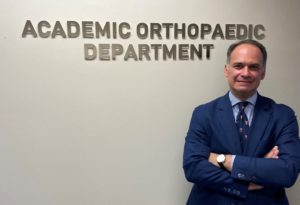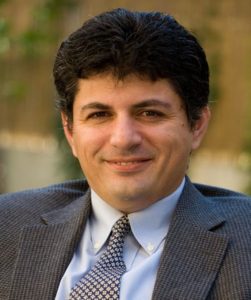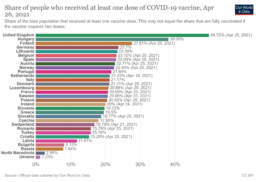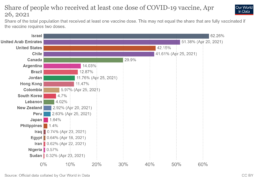EHS Secretary General, Professor Eleftherios Tsiridis

We are experiencing extremes across the world regarding the pandemic this week. India is suffering a devastating spike with 6 consecutive days of cases over 300,000 and so many fatalities (over 200,000) that the crematoriums are overwhelmed and the armed forces have been deployed to assist the hospitals. Israel on the other hand has had the first night since the outbreak began where nobody lost their life to COVID-19.
While our hopes remain focused on India, please enjoy a report on the good news directly from our EHS International Member in Israel, Prof Yona Kosashvili, who writes an excellent Diary of an Orthopaedic Surgeon facing COVID-19 this month. Thank you very much to him.
Below is the update of the vaccination progress in our EHS member countries across the world, taken from Oxford University’s Our World in Data. Meanwhile, please do contact the EHS Secretarial Office via our Membership Secretary (samstokesehs@gmail.com) with reports on the COVID-19 developments in your area which you would like to share directly with our fellow hip surgeon members. Thank you.
Covid-19 and its influence on Medicine, Orthopaedics and Arthroplasty surgeries in Israel, by Dr Yona Kosashvili
 It is a privilege to be an Ambassador for the European Hip Society. I would like to share some of my personal experience as an arthroplasty surgeon and a head of an orthopaedic department in Israel during the stormy Covid-19 year.
It is a privilege to be an Ambassador for the European Hip Society. I would like to share some of my personal experience as an arthroplasty surgeon and a head of an orthopaedic department in Israel during the stormy Covid-19 year.
Although Israel is not literally an island, it has quite a few resembling characteristics of an island country. Mainly, the fact that the major flow of population in and out of the country is via its international airport. Thus, there was a theoretically reasonable chance of restricting the influx of Covid-19 patients and containing its outbursts. However, as it often happens in history, the shift of paradigm occurs only in retrospect and not ahead of times.
Consequently, we experienced three major waves of Covid-19 that claimed the lives of nearly 6000 people. The third wave of Covid-19 claimed nearly half of the death toll. We have seen a dramatic change in the course of the pandemic. The main victims of the first wave were elderly and debilitated people in their eighties, while the main victims of the third wave were people in there sixties and fifties suffering from minor chronic illnesses such as diabetes, hypertension and mild obesity.
Our society, which unfortunately is well trained and prepared for extreme threatening conditions such as war was not actually prepared for this kind of calamity. However, the mindset of the main portion of the population and the military as well as the civilian support systems was well set in order to generate a counter reaction. The health system received ongoing support from our military and intelligence agencies that helped both in the logistical and operational aspects. During the period of lockdowns, food and provisions were distributed to every civilian in need by the army and National Guard personnel.
Israel was one of the first counties to embark on a nation-wide vaccination operation. The population was very cooperative in getting vaccinated and the nay-sayers have rapidly become obscure and less relevant. Luckily, we have not witnessed any substantial side effects from the vaccination in the past three months, while more than 50% of our general population have been vaccinated. Yesterday, was the first day with no one reported deceased because of Covid-19 since the outbreak of the pandemic!
This gives us a real hope that the vaccination is effective, not only against the original form but also versus other variants. It is encouraging that the technology is there to allow us to return to our normal life. Yes, routine is undoubtedly a blessing!
I work as a head of an orthopaedic department in a level II Trauma centre in the greater Tel Aviv area. We have 36 doctors on our team covering all fields of orthopaedic surgery except Oncology. In addition. I work in the public sector. I have completed a fellowship training with Prof Allan Gross, David Backstein and Oleg Safir at the Mount Sinai Hospital in Toronto, Canada in the field of primary and revision arthroplasty surgeries. Luckily, none of my team members had a severe form of the disease despite the wide exposure to our patient population. That may be attributed to the distinct discipline of wearing protective measures such as gloves, face masks and using alco-gel at all times of duty.
We experienced prolonged lockdown periods that restricted the number of elective arthroplasty surgeries. In addition, there was simply a sort of melancholy in the population that drifted patients away from elective non life-saving surgeries during the peaks of the pandemic. However, this effect was sinusoidal and there was a substantial rebound as routine was gradually reached. Overall, we have witnessed a decline of 15-20% in the number of primary knee and hip replacements during the passing year. This is true for the private as well as the public sector.
I would like to conclude with a special thanks for the European Hip society for asking me to write my report and share my views and personal experience. Together we can overcome this pandemic. Of course, we need the technology. But that is not enough. On top of technology we need our humanity and personal as well as collective responsibility. We may need to face even greater challenges than Covid-19. We are on our way to put the current pandemic behind us and I am positive that together we can successfully face and overcome the challenges yet to come!



